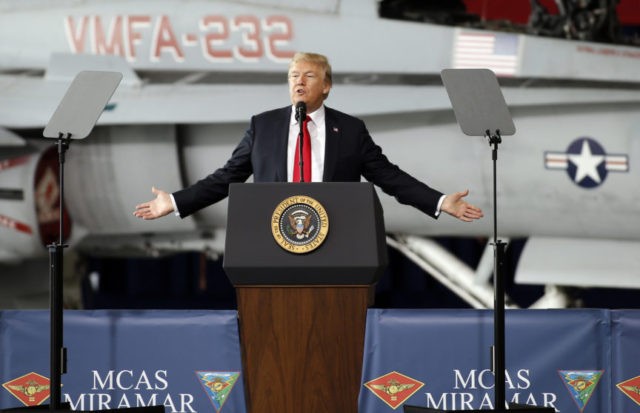The Chinese state newspaper Global Times chided U.S. President Donald Trump Wednesday in a piece analyzing the removal of Rex Tillerson from his position as secretary of state, claiming the high turnover in the administration shows Trump has a “lack of willingness or ability” to “see disagreements resolved.”
The critique comes on the week that Chinese leader Xi Jinping announced the creation of a “National Supervisory Commission” more powerful than the nation’s supreme court, tasked with weeding out “corruption” and any ideological dissenters from the Communist Party.
The Global Times has repeatedly criticized the United States in general for allowing a diversity of political opinions to thrive in public, deeming this a state of “division” and “chaos.”
Xi’s regime also banned the phrase “I don’t agree” from social media platforms this month.
Despite Xi Jinping’s record of resolving disagreements with brutal state force, the Times lamented the removal of Tillerson as a sign that President Trump has no tolerance for dissent. Noting that, before Tillerson, “over a dozen high officials in the Trump Administration left their posts,” the Global Times claimed that “one can reasonable argue” that Trump possesses “a lack of willingness or ability … to see disagreements resolved.”
“As the tribulations inside the Trump Administration mount, such news foretells of a lack of decision and efficacy in Washington on the global stage,” the newspaper argued.
The Global Times then goes on to list a series of issues in which Trump’s stances have not changed since he announced his run for president—”climate change, world trade, and the status of Jerusalem”—as areas that have become a “cause of concern” due to Trump’s “unpredictability” and his administration’s “half-handed” foreign policy.
The Times also complains that Trump’s announcement that he would accept a meeting with North Korean dictator Kim Jong-un was “unexpected” to China, exposing the Chinese government’s displeasure at being relegated to a minor role in the North Korean crisis. In other articles, the Global Times has launched a campaign to give all credit for that meeting to Xi Jinping and dismiss observers who claim Trump “marginalized” the communist country.
The state newspaper also has little positive to say about CIA Director Mike Pompeo, who will succeed Tillerson at the State Department. Pompeo, the Times notes, is “known for his stern views” and his positioning as top diplomat will lead “to uncertainty and a higher risk.”
Xinhua, China’s more “objective” state news outlet, also weighed in on the replacement of Tillerson with Pompeo, suggesting that Pompeo’s rise “may indicate further aggressiveness in U.S. foreign policy and the U.S. trade stance.” The outlet cited “U.S. media” as claiming that Tillerson was removed for unpleasant “body language during meetings” and never quite being “Trump’s guy.”
China’s relationship with Tillerson, a longtime businessman who approached the diplomatic job with a conciliatory outlook, had soured in the past year. Tillerson first approached China with a statement urging “no conflict, no confrontation, mutual respect and win-win cooperation,” almost verbatim echoing Xi’s communist propaganda, but in recent months escalated his criticism of China’s business practices, particularly the oppressive nature of its debt agreements with developing countries.
Tillerson repeatedly used the word “predatory” in 2018 to describe the loans China offered countries in Africa and Latin America to get them to participate in One Belt, One Road (OBOR), a sprawling economic initiative for China to build roads, ports, and train stations connecting Beijing to western Europe. Chinese officials have insisted that Latin America must be connected to the Ancient Silk Road, urging countries like Ecuador and Venezuela to take out loans and allow China access to their ports. The program would conclude with brand-new infrastructure in the hands of the Chinese government, enriching the Chinese at the expense of local people, who would then have to pay back their astronomical loans.
Before what would become his final overseas trip as secretary of state, Tillerson warned African states of this threat.
“Chinese investment does have the potential to address Africa’s infrastructure gap, but its approach has led to mounting debt and few, if any, jobs in most countries,” he warned. “When coupled with the political and fiscal pressure, this endangers Africa’s natural resources and its long-term economic political stability.”
China, he added, “encourages dependency using opaque contracts, predatory loan practices, and corrupt deals that mire nations in debt and undercut their sovereignty, denying them their long-term, self-sustaining growth.”
In response, the Chinese Foreign Ministry attacked Tillerson for his “irresponsible” remarks and urged the United States not to comment on China’s relationships with underprivileged countries.
How this relationship to the State Department will change under Pompeo remains to be seen, but some observers expect a hard-line approach towards China’s disruptive colonization plans around the world.
“It says to China: ‘You are our enemy,’” CNBC’s Jim Cramer said of Pompeo’s nomination on Tuesday. “This is about China being our intellectual and economic enemy.”
This week, before Tillerson’s departure, Pompeo said in a Fox News interview that he was extremely concerned with China’s plans to take over much of the international waters surrounding it.
“If you look at the president’s national security strategy, it was very clear that what the Chinese are doing, whether that would be on trade or the theft of intellectual property or their continued advancement in East and South China Seas, this administration is prepared and engaged in pushing back against the Chinese threats so that we can have a good relationship with China in a way that the world desperately needs,” Pompeo said.
In January, Pompeo suggested that China presents a much greater threat to American interests than Russia. “The Chinese have a much bigger footprint upon which to execute that mission than the Russians do,” he told BBC. “We can watch very focused efforts to steal American information, to infiltrate the United States with spies—with people who are going to work on behalf of the Chinese government against America.”

COMMENTS
Please let us know if you're having issues with commenting.